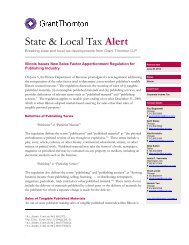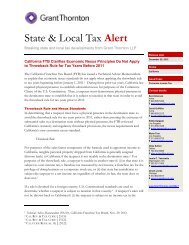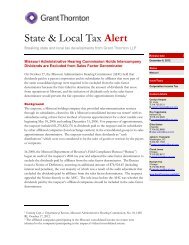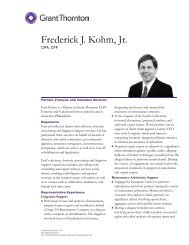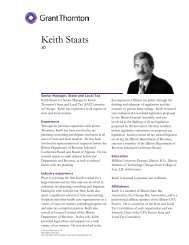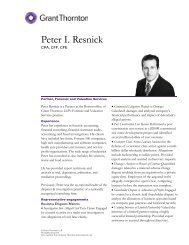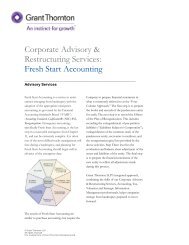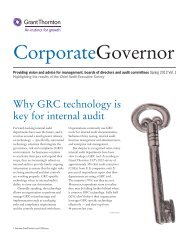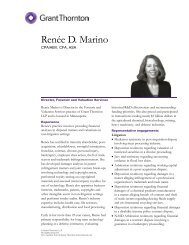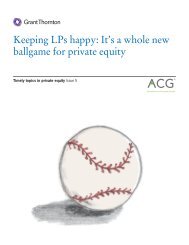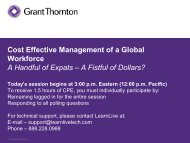Market Structure Redux - Grant Thornton LLP
Market Structure Redux - Grant Thornton LLP
Market Structure Redux - Grant Thornton LLP
You also want an ePaper? Increase the reach of your titles
YUMPU automatically turns print PDFs into web optimized ePapers that Google loves.
Reuters. The number of deals completed in the second quarter remained<br />
flat at 42, compared with the first quarter. Despite the rise,<br />
investment levels have a long way to rebound from 2007 and 2008.<br />
“There is a crisis of liquidity. Historically, relatively small VC<br />
companies reflect and say maybe we do need to invest in an ecosystem<br />
maybe it isn’t so easy. No. 2, we are now in a slow growth<br />
economy, most people don’t people think there will be a V-shaped<br />
recovery, most people think there will be a premium for growth.<br />
That means you will have to buy growth companies again,” says<br />
Deninger. “There is a two, top three, year cycle where you will see<br />
growth companies again. People will look at small cap companies<br />
because they need the alpha. For this reason I have hope, I think<br />
you are going to see the emergence of new growth industry coming<br />
out of the economic slump. With alternative energy, cleantech,<br />
I think you are going to see a signs in 2010 and 2011, you will<br />
see a significant number of companies go public in the cleantech<br />
space. It’s going to get people interested. Fourth, Washington is<br />
going to have to wake up and see that unintended consequences<br />
have to be addressed. When times are good, nobody worries about<br />
job creation and growth. Once we’re done jamming up the deficits<br />
people are going to say we have to grow our way out of this. They<br />
have been able to ignore. “<br />
Amid unprecedented government intervention in the financial<br />
markets, regulators and legislators are grappling with how to<br />
oversee the behemoths and fend off future collapse. At odds with<br />
President Obama’s plan to focus power on the Fed, Schapiro wants<br />
a single systemic-risk regulator to collect information from the<br />
biggest financial firms and, where necessary, force them to raise<br />
capital and hold more liquid assets through standards “developed<br />
by the council.” Congress is mulling legislation that would enact<br />
Obama’s proposal for the biggest revamp of financial markets oversight<br />
since the 1930s.<br />
“Certainly this administration has taken this initial action to<br />
cast a very wide net, the widest net possible. I think everyone’s<br />
scratching their head now because players have changed and<br />
these things are going to take a lot longer,” says Heesen. “It’s not<br />
like in old USSR where you just got things done. Each country<br />
has leaders change, parties change and ideologies change. This<br />
democracy thing can be problematic sometimes.<br />
Looking back, Deninger notes: “There are some good reasons<br />
why this is happening. Before we talk about how we shot ourselves<br />
in the foot, globalization is working. From 1950 to 2000, during<br />
that period of time, the U.S. was the envy of the world except for<br />
a period of time in the Carter and late Ford administrations when<br />
we went through deflation. We were an oil exporting company until<br />
1949. That’s followed by our incredible leadership of the global<br />
technology industry. U.S companies were fastest to adopt technology<br />
in other industries in order to enhance performance.”<br />
“Just as we feel it is natural that American companies go public<br />
on the NYSE, Indian companies and Chinese companies should<br />
want the same, and the Nasdaq. Then naturally we are going lose<br />
the virtual monopoly that New York had. In Russia and China, where<br />
companies were privatized, in 2007, the two largest IPOs took<br />
place in Russia and China,” he says. “That the greatest expression<br />
of capitalizing – public offerings – took place in communist countries<br />
is fascinating. Democratization of capitalism is a good thing,<br />
but that doesn’t mean we should be shooting ourselves in the foot.”<br />
As Congress, the Obama administration and the SEC grapple<br />
with the Herculean task of mending the ailing economy, it’s unlikely<br />
they are even aware of the fundamental market structure<br />
changes that result in mounting unemployment.<br />
Leibowitz believes the current market structure<br />
can be “fixed,” but that “I think it’s going to take<br />
some hard actions by the SEC to step in.”<br />
“I think that once [the Obama administration] thinks about this<br />
problem, it will see that it is one of the solutions to creating jobs in<br />
this country that does not require the government spend a nickel;<br />
creating a different market in which these smaller capitalization<br />
companies can go public without spending federal money,” says<br />
Halloran. “This market will form itself once an environment that<br />
creates commission dollars and trading revenue is created that will<br />
in turn support higher amounts of higher quality research.”<br />
It’s still unclear what, if any significant, impact TARP, the<br />
$700 billion U.S. bailout program for financial firms will have on<br />
the markets and the economy, but such programs do not even<br />
begin to address the problems with market structure. (For more on<br />
TARP, read Online Editor Riley McDermid’s story on page 22.) As<br />
the U.S. falls further behind other developed nations in terms of<br />
publicly listed companies, bigger firms continue to slash jobs and<br />
the number of smaller ones, who employ the majority of Americans,<br />
continues to shrink.<br />
“We all have to realize that the underlying engine for economic<br />
growth is private enterprise. That’s how taxes get paid it this<br />
country, either by enterprises or their employees. If we continue to<br />
stimulate it by government funds, it creates an artificial market,”<br />
says Halloran.<br />
“We have to find a way to stop that so we can allow the market<br />
itself to operate so there is reliable asset pricing and reliable<br />
trading,” Halloran says. “At some point we need to find ways to<br />
stimulate and restructure the market without government money<br />
because that’s artificial. We need to let the markets find their own<br />
way at the end of the day.”<br />
°<br />
marketsmedia magazine I september/october 2009 13




